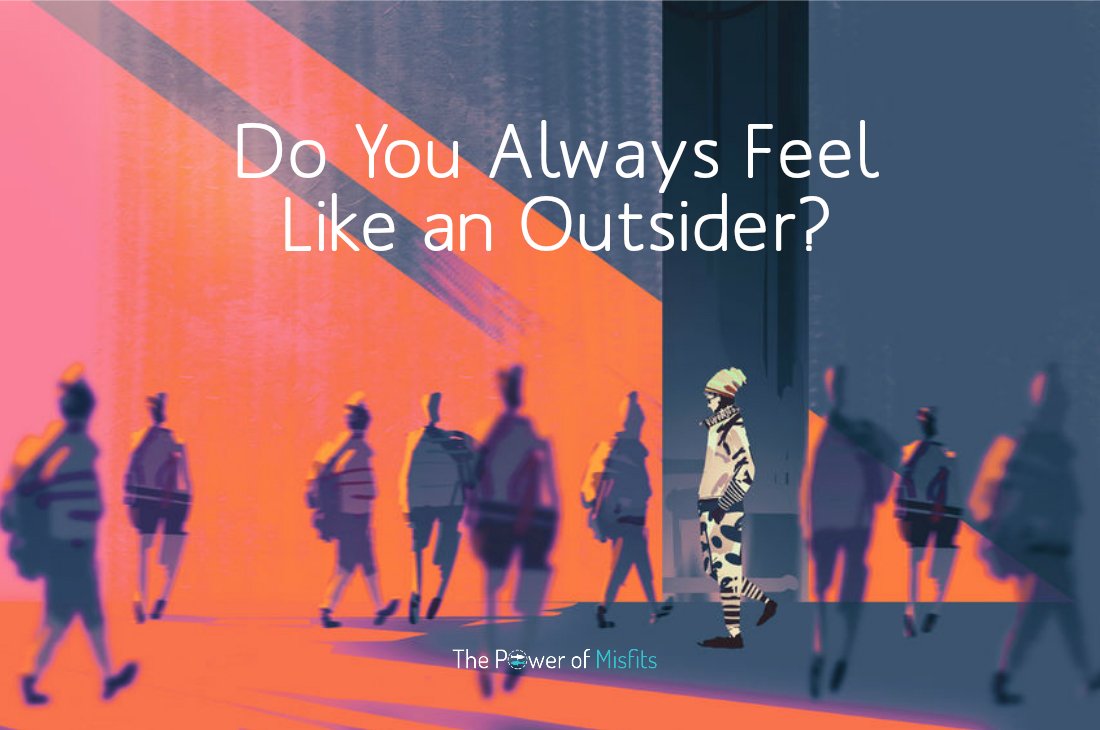If you know what feeling like an outsider is like, you are not alone. This feeling is more universal than it may seem. Moreover, the reasons behind it are not always negative.
I always feel like an outsider in big groups, and this is when I catch myself thinking, “What am I doing here, with these people?” Starting from my early school years, I could never fit in with my peers or feel like I belonged with other people. In a sense, I always felt cut off from society for some unexplained reason.
If you can relate to this experience, perhaps you are a loner just like I am. But there could also be other reasons why you feel isolated and alienated from those around you.
Let’s explore this uncomfortable emotional experience and try to figure out where it comes from and how you can cope with it.
‘Why do I always feel like an outsider?’ 4 reasons
There are a few factors and reasons that can leave you feeling like an outsider with other people, sometimes even in your own family.
1. Introversion

Many introverts feel like outsiders, be it in school, college, or the workplace. Not only introverted people themselves but also their parents, teachers, and supervisors misinterpret their quiet personalities for poor social skills and the lack of dynamism.
Seeing how easily your peers make friends with each other and speak up in the classroom can make you question yourself. “Am I worse than they are? Am I a failure? Why do I struggle with the things that come to others so easily and naturally?”
Because of this, introverted children and teenagers are more prone to feeling like outsiders. But also later in life, the quiet ones may feel inadequate and isolated at large social gatherings or in the workplace.
This is particularly evident if you are not just an introvert but also a loner. Until you make sense of your personality and fully accept yourself, you will most likely spend years of your life thinking that something is wrong with you.
2. Self-esteem
Probably the most common reason for feeling like an outsider is low self-esteem, which is often paired with an inferiority complex. If you are convinced that you are not good enough, it is a sure road to feeling unwelcome, left out, and rejected by other people even when it’s not true.
Self-esteem issues can easily lead you to unhealthy comparisons and trick you into believing that you are inferior to others. When you find yourself in the company of other people, your inner critic works hard to expose your flaws and weaknesses.
As a result, instead of connecting with those around you, you are busy overthinking your faults, worrying that you will say something wrong, and dwelling on the illusion that others don’t want you to be there.
This is when you start feeling like an outsider, a failure, and a misfit in the midst of a party or gathering.
3. Toxic environment
Feeling like an outcast doesn’t always stem from your own personality traits. Sometimes it originates from the way those around you treat you.
For example, if you are used to feeling like an outsider in your own family, it could be that your parents are overly critical and demanding. Children of such parents never feel like what they do – and what they are – is enough. As a result, they are haunted by an unhealthy belief that they don’t deserve to be loved and accepted.
Being an outsider in your own family may also indicate that you play the unfortunate role of a family scapegoat. Perhaps you are blamed for the most minor faults or criticized no matter what you do. Moreover, if your parents are successful people and your siblings are more accomplished than you are, it’s easy to feel like the black sheep and a failure because you don’t meet family expectations.
Feeling like an outsider is not limited only to the family environment though. It can also happen at work or in your friend circle. You might be surrounded by overcritical people who make you feel inferior and unwelcome. Or it may seem to you that your friends or co-workers move forward in life while you stay behind.
Even if this is the case, people who truly care about you would never make you feel like an outcast just because you are less successful than they are.
4. Perceptiveness

Finally, one more reason why you always feel like an outsider may be hidden in your sensitive nature. Just like introversion, it’s not a flaw – it’s just a personality trait that has certain drawbacks when it comes to being a part of modern society.
Deep thinkers, highly sensitive loners, and spiritually minded people have always experienced difficulties with fitting in. Even the greatest thinkers in history faced rejection and misunderstanding.
All these individuals have one common trait – perceptiveness. Whether it comes to empathizing with another’s pain, pondering about life’s mysteries, or analyzing the things that happen in the world, they are capable of seeing and feeling more than the average person.
Thus, if you are feeling like an outsider, it could be that you don’t fit into today’s society with its superficial values, and it’s a good thing. Do you have a feeling that everyone is busy pursuing monetary goals and succumbing to base instincts? Does it seem to you that we live in the age of cultural decay and mind-numbing consumerism? Do you have no interest in popular activities and aspirations?
If you think about all this and it makes you feel sad and isolated from society, it could be that being a social outsider is a consequence of your sensitive personality.
How to stop feeling like an outsider?
1. Figure out whether the feeling is valid and what causes it
Sometimes being an outsider is just a perceived feeling. It may stem from self-criticism or a lack of meaningful relationships with other people.
Maybe you set the bar too high for one or another reason, which leaves you feeling unsatisfied and not good enough. Perhaps you seek to blend in with the wrong people, and no matter how hard you try to be like them, you fail.
It can even be as big as following the wrong path in life, and the unsettling feeling that you don’t fit in is a wake-up call that you need to reconsider your priorities and goals.
Feeling like an outsider is not always the same as being one. So, the first step is to analyze your emotional states and responses when you are in the company of different people. When do you feel like an outcast most often? With whom or under what circumstances does it usually happen?
Pay attention, and you will have your answer.
2. Improve your self-confidence
If you feel inadequate to others on a regular basis, it goes down to self-esteem issues. Whether you feel like an outcast, struggle with the fear of missing out, or believe that you are a failure compared to others, it has to do with a lack of confidence.
The universal truth is that it’s our perception of ourselves that makes us feel more or less comfortable around other people. For this reason, if you often feel like a misfit and outsider, set a goal to improve your self-esteem and practice confidence-boosting activities every day.
With small, steady steps, you will soon notice that you are much more confident and relaxed in social settings. You can check this guide to learn how to boost your self-esteem.
3. Make sure you are not mistreated
We often try to fit in with the folks we don’t belong with. Social conditioning, other people’s expectations, and the fear of being alone can easily cloud our judgment and leave us believing that the individuals we surround ourselves with are the right company for us. Or that we are treated better than we are.
That’s why it is important to make sure you are not mistreated if you often feel like an outsider with certain people, including your family and friends.
Sometimes our loved ones cross the line of being frank and end up being harsh and intimidating. Try asking yourself the following questions:
- Do this person’s remarks and jokes sound mean?
- Do they often try to excuse their behavior with “just kidding” kind of phrases?
- Are you afraid that you will be ridiculed or misunderstood if you speak your mind or share something personal?
- Do you often feel excluded from group conversations or activities?
- Are you often criticized for your decisions such as the choice of career or a romantic partner?
4. Cultivate self-acceptance
Finally, being a social outsider is not always a bad thing, as we discussed above. Keep it in mind if you are an introvert, loner, or deep thinker who feels misunderstood and alien to modern society.
Sometimes when you don’t fit in with the majority, it’s an indication that you are doing the right thing. If you still question yourself, remind yourself that you are following your unique path in life, and it’s fine if it differs from that of other people.
When you feel like an outsider at work or a social event, practice positive self-talk that cultivates self-acceptance. For example, you can use phrases such as:
- I am a unique human being
- I am confident with the path I’m walking
- I fully accept myself and recognize that my flaws are a part of me and make me who I am

To sum up, if you are feeling like an outsider right now, remember that you are not alone. You would be surprised to know that more people than you could imagine feel this way too for one or another reason.
Even successful and confident personalities can sometimes feel like outcasts when they find themselves in the wrong company. So make sure you spend time with the right people and feel good about yourself.
The most important truth I’d like you to remember is that being loyal to yourself matters more than blending in with others.


